The 11 Best Foods to Support Your Immune System
Keeping our immune systems stable is essential if we want to stay healthy, but doing so isn’t always as easy as it sounds.
Our bodies rely on a stable diet of immunity-supporting foods, and the complexity of juggling work and family time often leads to avoiding high-quality meals in favour of something fast and easy. If we’re living by ourselves, it often seems easier to either skip meals or buy takeaway. If we have families, our cooking often caters to fussy eaters and dietary preferences or restrictions.
It’s also difficult to know exactly what you should be including in your diet. With so many health gurus, bloggers and fitness personalities saying different things, separating proper nutritional advice from the latest trend is harder than ever.
The important thing is that you get the correct dose of vitamins and minerals – they allow your immune system to function properly, and, without them, you’re more vulnerable to sickness.
In this article, we break down the top 11 foods you should be including in your day-to-day diet, and explain how they support your immune system. Keep reading to find out more.
Role of Healthy Food in Improving the Immune System
The immune system is, in a nutshell, what keeps us free from sickness. It produces cells which find and neutralise invasive pathogens.
Some cells (produced by the innate immune system) are the first responders to diseases and infections, but aren’t highly effective [16]. Others (produced by the adaptive immune system) actually remember specific pathogens, and then develop a specialised response which they use if they encounter that same pathogen again [16]. Our bodies really are amazing!
Our diet comes into play because producing all these cells requires the proper nutrients. If our immune system is ‘activated’ (when we get sick or infected), it uses even more energy than normal [16]. That’s why it’s so important to eat well and healthily – if you’re low on energy or missing essential nutrients, you’re much more likely to get sick.
Vitamins A, B6, C, D and E, copper, folic acid, glutamine, iron, selenium and zinc are the most important vitamins and minerals for supporting your immune system – they each play a different role in combating pathogens [15, 17]. Protein is also critical for maintaining a good immune response, and is particularly necessary for the cells of the adaptive immune system [14].
Eggs
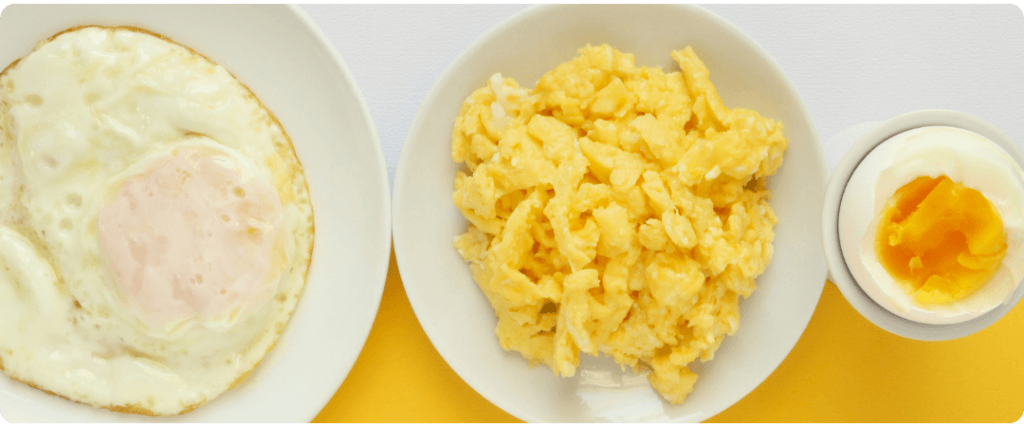
Poached, scrambled, fried, boiled or benedict – how do you like yours? Eggs have been a popular food for thousands of years, and with good reason.
These nutritional powerhouses are packed with vitamins A, B2, B5, B6, B12, D, E and K, as well as calcium, folate, phosphorus, selenium and zinc [18]. They’re also a great source of protein, contain antioxidants like lutein and zeaxanthin, and help raise HDL (the good type of cholesterol) [18].
Vitamin D is difficult to get from food – in fact, most of our vitamin D is absorbed topically and comes from sunlight. That’s what makes eggs so important, particularly for those who suffer a vitamin D deficiency. Vitamin D has been strongly linked to combating influenza and upper respiratory tract infections, thanks to the way it modulates immune responses, fights inflammation and supports both the innate and adaptive systems [20]. If you’re suffering from a cold or flu over winter, try eating up to two eggs a day to increase your vitamin D intake.
It’s unusual to find such a versatile food that’s so helpful for immune system, but eggs are it! They’re a great source of energy, making them a perfect start to your day. If you’re looking to really kickstart your immune system, begin the day with poached eggs and avocado toast (avocado is also good for your immune health).
Greek Yoghurt
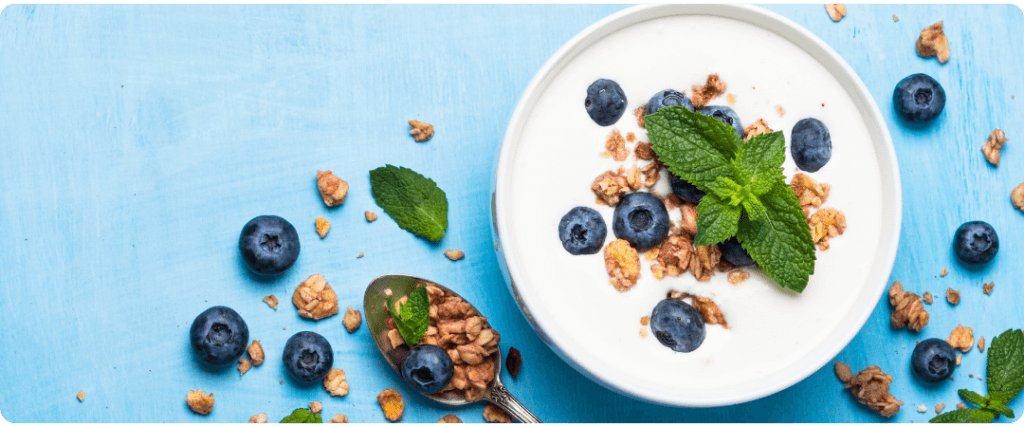
Greek yoghurt might not taste quite as nice as the flavoured pots of processed dairy you can buy at the supermarket, but it’s a whole lot healthier – healthy enough, in fact, to make this list. Its impressive nutrient profile and lack of sugar make it a great alternative to sweeter snacks like custard and ice-cream.
Good-quality Greek yoghurt is packed with probiotics, which help your digestion and promote greater absorption of vitamins. These helpful bacteria also regulate immune responses, as well as forming a physiological barrier in your gut to help fight intestinal diseases like diarrhea, colitis, irritable bowel syndrome and enterocolitis [19].
Greek yoghurt’s vitamins and minerals include B12, which is essential for energy and health brain function, as well as calcium, which can assist with fat loss and maintaining strong bones. It’s also a good source of iodine, which helps regulate your metabolism, and contains phosphorus, potassium and B2.
If all of that isn’t enough of a reason to include it in your diet, there’s one last selling point: Greek yoghurt is fairly high in proteins, making it perfect for post-workout meals. It contains roughly 20% whey protein (great for repairing muscle) and 80% casein protein (great for maintaining muscle) [1]. It’s also high in branched-chain amino acids like valine, leucine and isoleucine.
Salmon
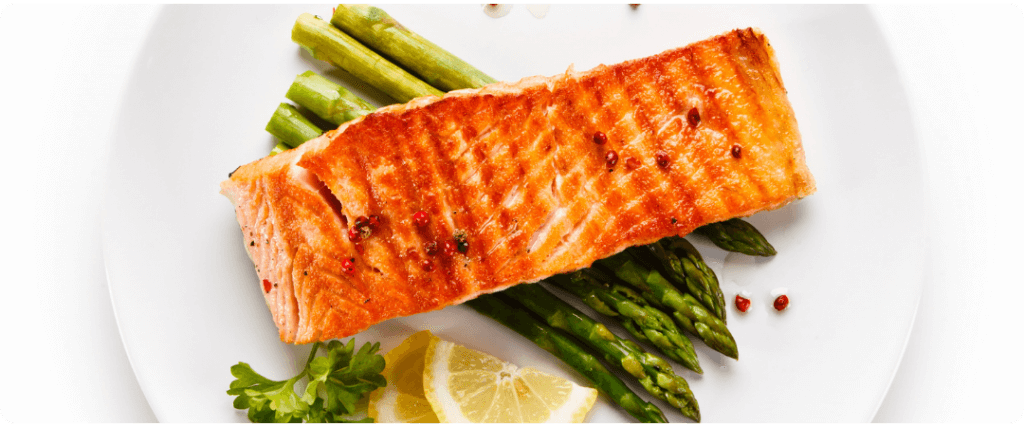
Not everyone likes seafood, but, unless you have intolerances, salmon is the one type of fish you need to be getting on your plate. An excellent source of protein, its omega-3 fatty acids, EPA and DHA, can help with a variety of different health issues. They can decrease inflammation, lower blood pressure and assist with arterial function [2].
Because inflammation is often cited as the root cause of more serious health issues like heart disease and cancer, we’re definitely counting this one as improving your immunity.
Salmon also has a full suite of B vitamins, like B1, B2, B3, B5, B6, B9 and B12. While these vitamins have a range of health benefits, they all work in conjunction to keep your brain and nervous system functioning smoothly, which is especially important as you get older.
Selenium, potassium and astaxanthin are also present in salmon – they boost bone health, lower blood pressure and lower cholesterol respectively.
Potatoes

When you think of ‘healthy eating’, potatoes probably don’t come to mind. We’re using to seeing these humble tubers processed into a variety of salted snacks, but, eaten baked, mashed or steamed, they’re actually full of health benefits.
Potatoes are full of different vitamins and minerals, like iron, phosphorus, calcium, magnesium, zinc, vitamin C, vitamin B6, quercetin, choline and folate. It’s also incredibly fibrous, which makes it great for aiding digestion [3].
So what do all those nutrients do? Well, they help virtually all aspects of your health, promoting everything from better bones to sleeker skin. Your heart, blood pressure, muscle memory, mood, memory and metabolism are all positively affected by eating potatoes. The relatively high amount of vitamin C is also beneficial for supporting your immune system.
Kale
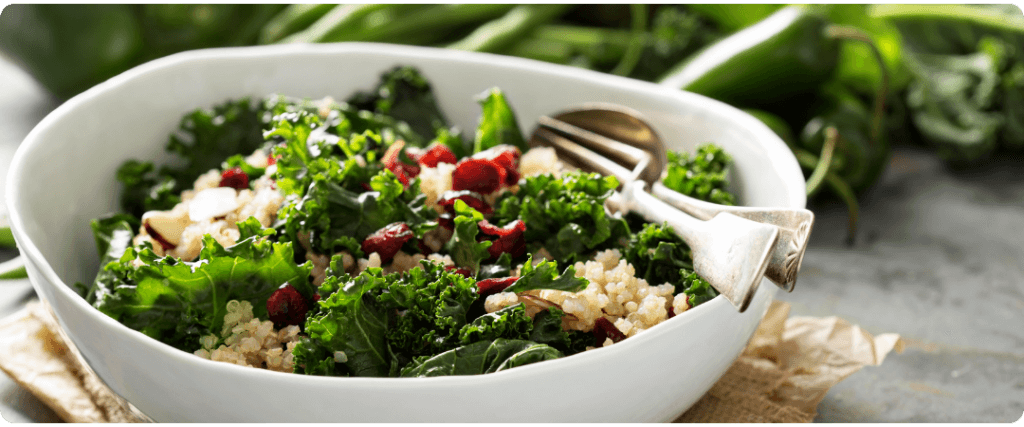
Commonly touted as a superfood, kale comes pretty close to matching that ideal. This leafy green is one of the most nutritionally dense foods on the planet, and eating it regularly can seriously benefit your health.
The most well-known thing about kale is how many antioxidants it contains. With beta-carotene, quercetin, kaempferol, lutein, zeaxanthin and other assorted flavonoids and polyphenols, this vegetable helps lower blood pressure, fight inflammation, combat viruses, protect your eyesight and act as anti-depressant [4].
It also packs a serious dose of vitamins and minerals, like:
- Vitamin A
- Vitamin B1
- Vitamin B2
- Vitamin B3
- Vitamin B6
- Vitamin C
- Vitamin K
- Calcium
- Copper
- Iron
- Magnesium
- Manganese
- Phosphorus
- Potassium
Impressed? So are we. A cup of kale actually contains more vitamin C than a whole orange, so it’s certainly one of the best immunity-supporting foods out there.
Spinach
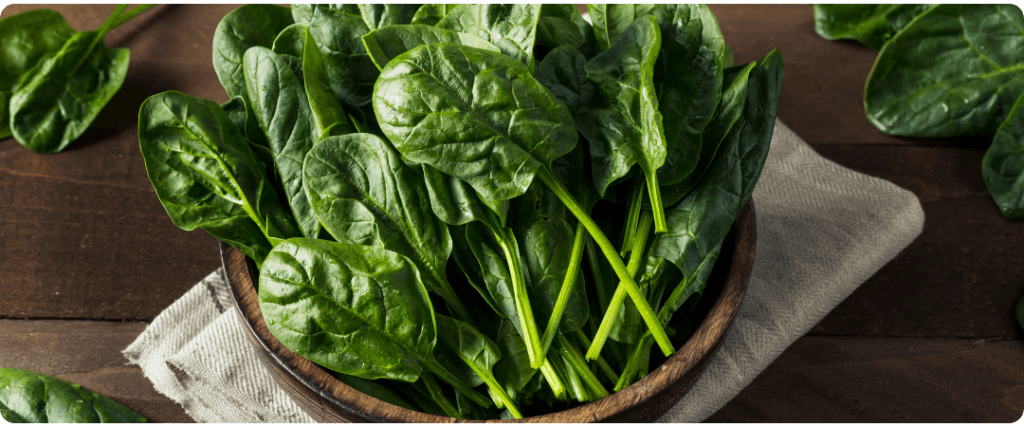
Popeye made sure the world knew about the powerful benefits of spinach, but, lately, it’s often brushed aside in favour of trendier superfoods. We’re here to tell you to keep this leafy staple on your plate, because it’s one of the freshest and most versatile plants out there.
The presence of diverse vitamins and minerals make spinach a great choice for people who don’t eat meat or dairy. Vitamins A, B6, B9, C, E and K1, in addition to folic acid, iron, magnesium, potassium and calcium, mean it’s a great option for salads and sides.
Spinach also contains a host of antioxidants like lutein, kaempferol, quercetin, zeaxanthin and nitrates, which work together to improve blood pressure and eye health [5]. While there’s no direct benefit to the immune system, spinach keeps the rest of your body health and can improve your energy levels, making it easier to fight off sicknesses.
Almonds
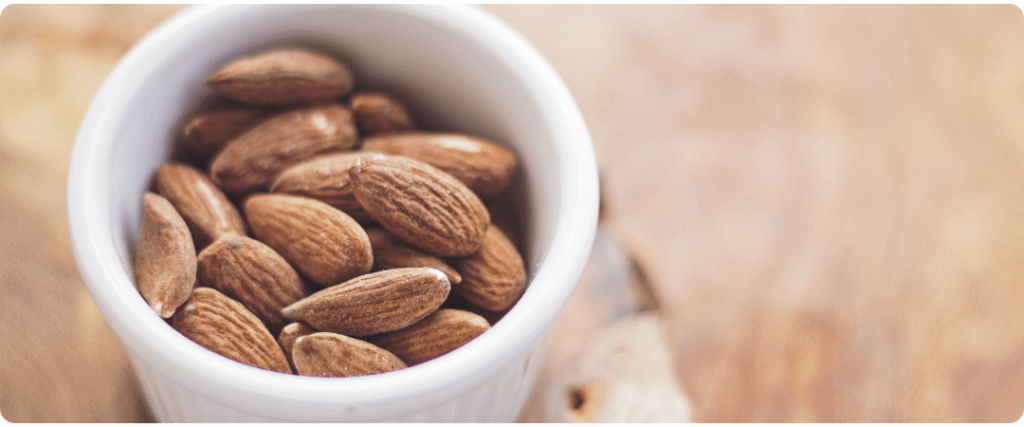
Nuts might not be in the same league as vitamin C-carriers like kale and broccoli when it comes to supporting your immune system, but they are renowned for their seriously impressive dose of nutrients. Almonds are arguably the best of the bunch, having been linked to lower cholesterol levels, better skin and improved memory.
Vitamin B2, vitamin E, copper, manganese, magnesium and phosphorus can all be found in almonds, but it’s the antioxidants that are really impressive. Tocopherol (an antioxidant found in vitamin E) and flavonoids work together with the other nutrients to reduce blood pressure and improve blood flow.
A 2014 study found you only need to eat a handful of almonds a day to achieve these benefits [6], so why don’t you make them a part of your daily diet? They’re great snacks, and perfect for discreetly eating at the desk or on the worksite. Alternatively, if you’re not an almond fan, other nuts like walnuts, macadamias and hazelnuts are also great for your immune system.
Capsicum
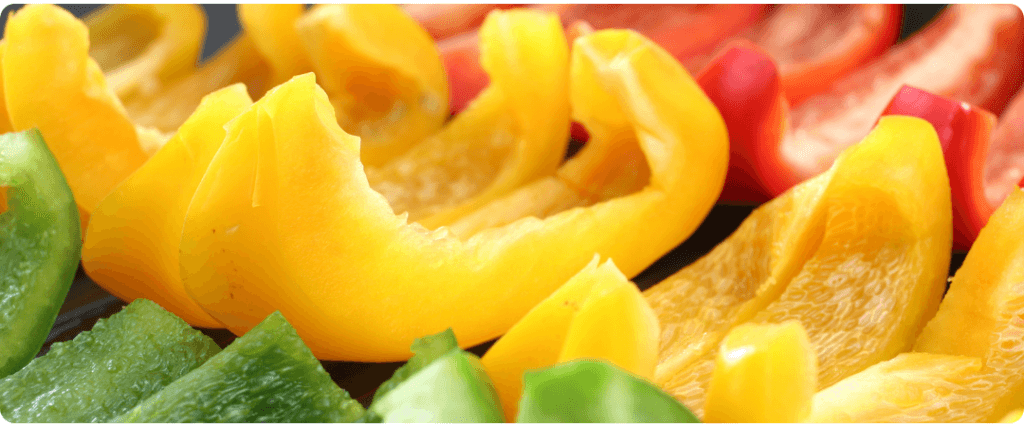
Green, red or yellow? There aren’t many plants that can match the capsicum when it comes to variety of colour. Crisp and mild-flavoured, this bell-shaped vegetable works well with everything from raw salads to stir fries. It also happens to be, hands-down, one of the best foods for supporting your immune system.
Why? A single red capsicum contains 169% of your Recommended Daily Intake for vitamin C, which isn’t actually a lot of flesh (capsicums are hollow) [7]. They also contain the vitamins A, B6, E and K1, as well as folate and potassium.
Its line-up of antioxidants – capasanthin, violaxanthin, lutein, quercetin and luteolin – can help combat conditions like heart disease and cancer, as well as improve general eye health.
Shellfish
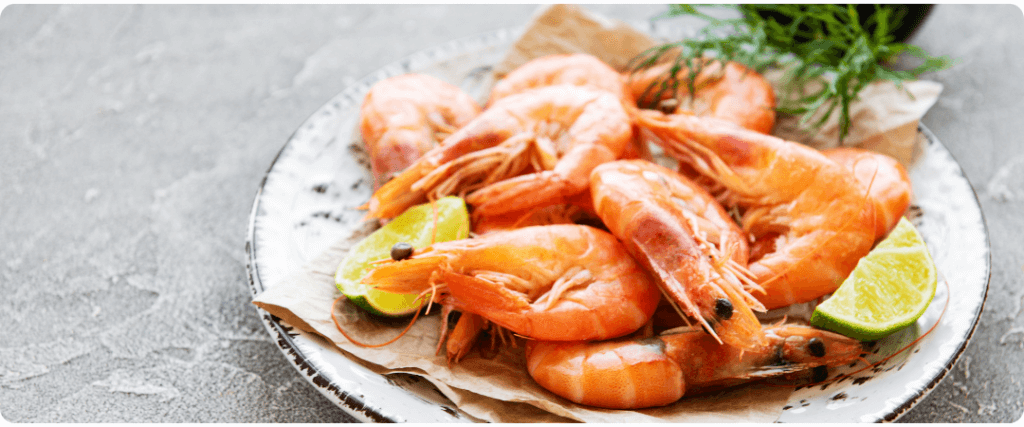
Shellfish are even more divisive than salmon – not everyone likes the fishy taste or high price tag, and many people have shellfish allergies. That said, they’re on this list for a reason.
Prawns, crayfish, lobsters, clams, scallops, oysters and mussels all count as shellfish, with impressive amounts of lean protein and beneficial omega-3 fatty acids. Pound for pound, they’re one of the most nutritious animal products out there, and are a great substitute for other, less healthy meats.
Most shellfish also contain high levels of vitamin B12, iron, magnesium and zinc, which, in addition to improving brain and heart function, also assist with your immune system [8]. Zinc is the mineral your body uses to help cells fight off infection and promote immunity, so it’s critical that you receive enough in your diet [9].
Ginger
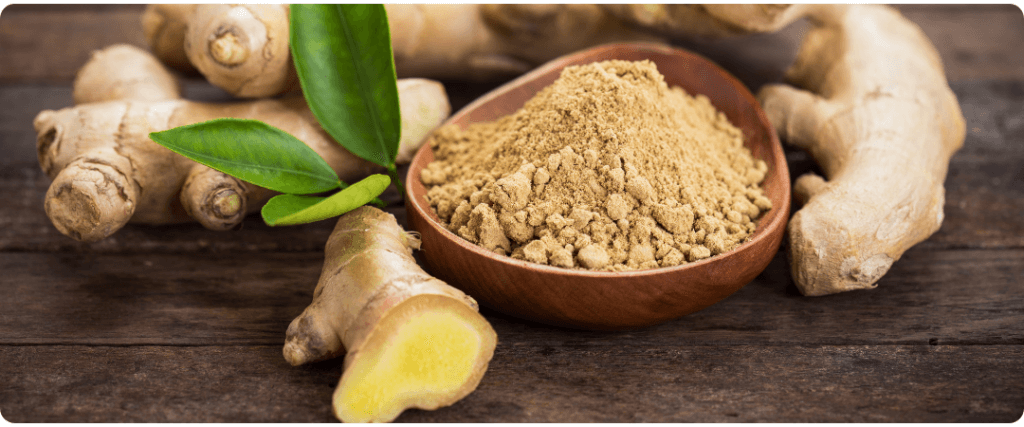
It’s probably no surprise that ginger has made this list. It’s one of the most popular anti-sickness spices out there, and has been used for thousands of years in traditional medicine.
Ginger’s long history begs the question – what makes it so effective? In large part, it’s the presence of gingerol, a bioactive compound that has potent anti-oxidative and anti-inflammatory effects. It also combats bacterial growth throughout the body [10].
Ginger is known to minimise nausea, relieve muscle pain, fight brain problems, help inflamed joints, lower cholesterol and blood sugar levels and even treat indigestion. Superfood? Yes, it certainly is.
Kiwifruit
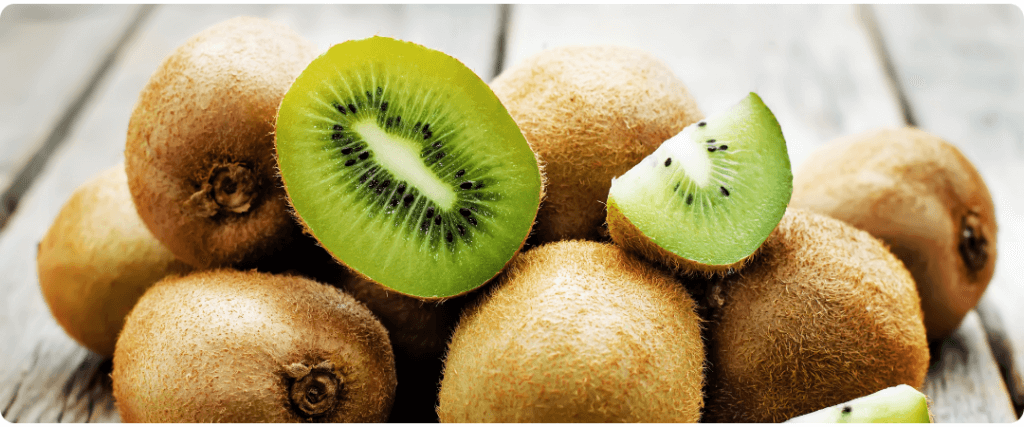
Last but not least, we present the humble kiwifruit. Its skin might be brown, furry and unappealing, but the flesh is vivid green, deliciously juicy and loaded with fantastic nutrients.
You might already know that kiwifruit are an excellent source of vitamin C. In fact, a 2002 study found that a single, medium-sized kiwifruit contains over 40 milligrams (the recommended daily intake is between 60 and 95 milligrams) [11, 12].
The presence of other nutrients like vitamins E and K, folate, potassium and antioxidants like zeaxanthin and lutein mean kiwifruits help everything from blood pressure and blood clotting to digestion, asthma and vision loss [13].
Not only are these little fruits easy to eat, they also go well with other healthy choices like Greek yoghurt, making them incredibly easy to add to your diet.
What happens if I don’t have time to prepare all my meals?
Eating healthy is always the best option. But sometimes we forget. We forget to meal-prep. We forget to buy what we need at the supermarket. We forget that we have to work late, and end up skipping dinner.
When our bodies don’t get the nutrients they need, our health suffers. But it doesn’t have to. AdVital is a complete nutrition supplement, enriched with 27 vitamins and minerals and 15 grams of protein, and is perfect if you’re short on time and missing out. As a flavourless powder, it can be easily added to yoghurt, smoothies or meals to enhance your daily intake of nature’s essentials.
Created and produced right here in Australia, AdVital is gluten-free, vegetarian, halal and free from artificial colours and flavours. It’s the perfect way to combat shortages of essential vitamins and minerals and keep you and your loved ones healthy.
Mashed potatoes, scrambled eggs, Greek yoghurt, stir fries, salmon sauces … you can supplement them all with AdVital. What are you waiting for? Start taking back your immune health, one scoop at a time.
References
[1] Arnarson, A. (2019) Yoghurt 101: Nutrition Facts and Health Benefits. Retrieved from: https://www.healthline.com/nutrition/foods/yogurt
[2] Spritzler, F. (2016) 11 Impressive Health Benefits of Salmon. Retrieved from: https://www.healthline.com/nutrition/11-benefits-of-salmon
[3] Butler, N. (2017) How can potatoes benefit my health? Retrieved from: https://www.medicalnewstoday.com/articles/280579
[4] Gunnars, K. (2018) 10 Health Benefits of Kale. Retrieved from: https://www.healthline.com/nutrition/10-proven-benefits-of-kale
[5] Gunnars, K. (2019, May 4) Spinach 101: Nutrition Facts and Health Benefits. Retrieved from: https://www.healthline.com/nutrition/foods/spinach
[6] Choudhary, K., Clark, J., & Griffiths, H. R. (2014). An almond-enriched diet increases plasma α-tocopherol and improves vascular function but does not affect oxidative stress markers or lipid levels. Free Radical Research, 48(5), 599-606. DOI: 10.3109/10715762.2014.896458
[7] Arnarson, A. (2019, March 27) Bell Peppers 101: Nutrition Facts and Health Benefits. Retrieved from: https://www.healthline.com/nutrition/foods/bell-peppers#vitamins-and-minerals
[8] Streit, L. (2019, January 11) What is Shellfish? Everything You Need to Know. Retrieved from: https://www.healthline.com/nutrition/shellfish
[9] Prasad, S. (2008) Zinc in Human Health: Effect of Zinc on Immune Cells. Molecular Medicine. 14(5-6), 353-357. doi: 10.2119/2008-00033.Prasad
[10] Mashhadi, N. S., Ghiasvand, R., Askari, G., Hariri, M., Darvishi, L., & Mofid, M. R. (2013). Anti-Oxidative and Anti-Inflammatory Effects of Ginger in Health and Physical Activity: Review of Current Evidence. International Journal of Preventative Medicine, 4(1), 36-42.
[11] Leong, L. P., & Shui, G. (2002). An investigation of antioxidant capacity of fruits in Singapore markets. Food Chemistry, 76(1), 69-75. DOI: 10.1016/S0308-8146(01)00251-5
[12] Zeratsky, K. (2020) Is it possible to take too much vitamin C? Retrieved from: https://www.mayoclinic.org/healthy-lifestyle/nutrition-and-healthy-eating/expert-answers/vitamin-c/faq-20058030
[13] Gotter, A. (2016, December 14) 7 Health Benefits of Kiwi. Retrieved from: https://www.healthline.com/health/7-best-things-about-kiwi
[14] Daly, J. M., Reynolds, J., Sigal, R. K., Shou, J., & Liberman, M. D. (1990). Effect of dietary protein and amino acids on immune function. Critical Care Medicine, 18(2), 86-93.
[15] Chandra, R. K. (1997). Nutrition and the immune system: an introduction. The American Journal of Clinical Nutrition, 66(2), 460-463. DOI: 10.1093/ajcn/66.2.460S
[16] Childs, C. E., Calder, P. C., & Miles, E. A. (2019). Diet and Immune Function. Nutrients, 11(8). DOI: 10.3390/nu11081933
[17] Aranow, C. (2011). Vitamin D and the Immune System. Journal of Investigative Medicine, 59(6), 881-886. DOI: 10.231/JIM.0b013e31821b8755
[18] Gunnars, K. (2018, June 28) Top 10 Health Benefits of Eating Eggs. Retrieved from: https://www.healthline.com/nutrition/10-proven-health-benefits-of-eggs
[19] Yan, F., & Polk, D. B. (2014). Probiotics and immune health. Current Opinion in Gastroenterology, 27(6), 496-501. DOI: 10.1097/MOG.0b013e32834baa4d
[20] Gruber-Bzura, B. M. (2018). Vitamin D and Influenza—Prevention or Therapy? International Journal of Molecular Science, 19. DOI: 10.3390/ijms19082419
WellnessHub
